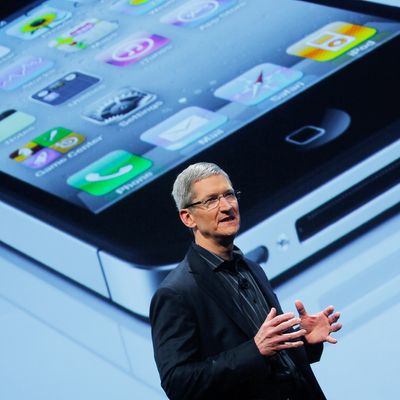
In the post–Steve Jobs era, is charisma still king?
That’s one question on the minds of Apple-watchers today, as all eyes turn toward San Francisco for news of the iPhone 5. Apple CEO Tim Cook, who will likely deliver the news, has never really delivered a new iPhone to the world before. (Cook announced the 4S, an incremental upgrade that was greeted with initial disappointment and a stock dip, but has never had a new numeral to himself.)
Releasing a new iPhone is more than just a gadget unveiling. Thanks to Jobs, who turned tech announcements into Broadway-caliber productions by outfitting them with dramatic tension and choreographed emotional appeals, it’s an art form unto itself. So, we wanted to know: Does Cook stand a chance of stacking up?
To find out, we turned to two Silicon Valley staging experts — corporate-presentation coach Jerry Weissman (author of Presenting to Win) and leadership expert Olivia Fox Cabane (author of The Charisma Myth).
Weissman, who once watched Jobs warm up for a speech during his NeXT days several decades ago, recalled seeing the CEO agonizing over details backstage — where he would walk, which gestures he would make, how pregnant his pauses would be.
“Jobs was a master at the trade,” Weissman said. “He put in the time and took care to polish and step through everything, almost to the degree of choreography. It was all very casual but all very careful.”
Perhaps stating the obvious, Weissman said that Cook might find Jobs’s standard a challenge to live up to.
“Cook is wrapped tight,” he said, after viewing an archived video of Cook’s iPhone 4S presentation. “He’s got his arms crossed in front of him, looking very defensive. He never smiles. Very serious. Not much vocal dynamic. He’s not blessed with a strong voice, and it has a little bit of a rasp, which is fixable. But he paces constantly.”
Cabane agreed that Jobs’s theatrical reveals are irreplaceable. (“Tim Cook can’t pull that off yet. He doesn’t project alpha dominance.”) But she said that smoothness shouldn’t necessarily be Cook’s goal.
“There’s not one form of charisma,” she said. “Here, in Cook, you have a guy that is not from the tech side of Apple, and maybe acting excited about the technology itself will give him the nerd cred he needs. He can counteract the impression of the smooth-talking sales guy and win over the early adopters.”
Admittedly, Steve Jobs is a fairly high bar for comparison. So, how, we asked, does Cook stack up to Facebook’s Mark Zuckerberg and Amazon’s Jeff Bezos?
“Bezos, he smiles,” Weissman said. “He’s warm. He’s enthusiastic. When he came out with the Kindle Fires, he held them up high, like he was carrying an Olympics torch. He shows he’s proud of it, and you believe him.”
Cabane panned Zuckerberg’s presentation style (“Comes across as awkward and not that likable“) but had kudos for Bezos. The Amazon CEO, she said, “could take up more space, project more power, and thus raise charisma. But that’s not his style. He wants to be understated, low-key.”
We asked why, in the post-Jobs era, Apple still needs to rely on this genre of the overhyped, dramatically tense announcement at all. Couldn’t they drop Jobs’s “but wait, there’s more!” shtick and just, you know, announce a new iPhone?
“You’ve got to sell,” Weissman said. “You can’t not sell. You can’t hide your light under a bushel.”





























